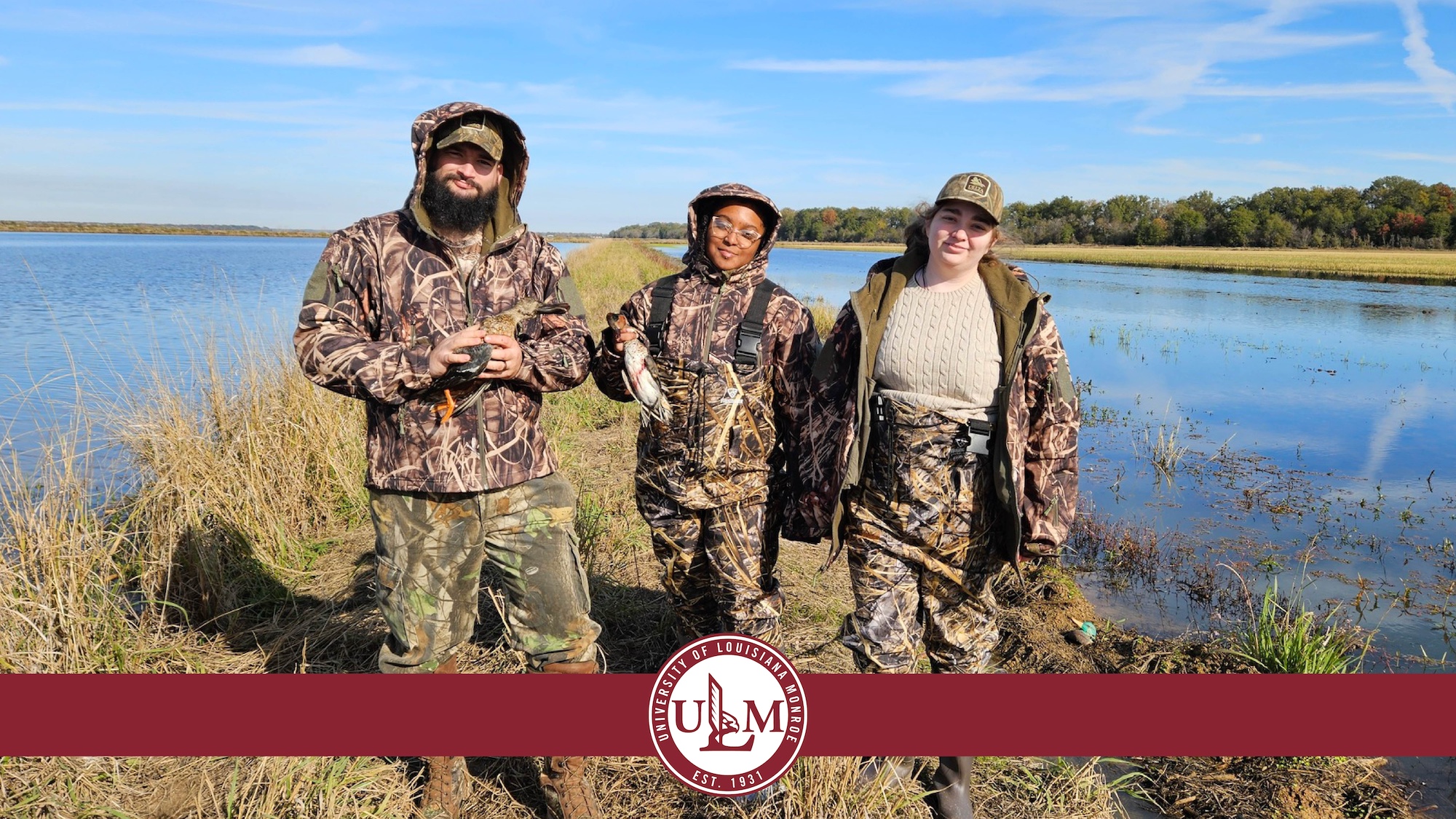Published February 19, 2024

CAPTION:Three ULM wildlife biology students participated in the University Hunt Program with Delta Waterfowl. Pictured L-R: Jordan Konicki, Makayla Holman, Ariana
Paulk
MONROE, LA – Three ULM wildlife biology students recently had their first duck hunting experience
thanks to a partnership with Delta Waterfowl. The University Hunting Program provides
students with first-hand experience of hunting culture and wildlife management. The
ULM biology program was approached by Delta Waterfowl and offered the opportunity
to establish the program at ULM. Assistant Professor of Biology Dr. Ana Couvillon
and Delta Waterfowl Hunter Recruitment Coordinator Aidan Flores were instrumental
in bringing the program to ULM.
The three students who participated in the program were Jordan Konicki, Makayla Holman,
and Ariana Paulk. Each student went through an online hunter safety course, paid for
by Delta Waterfowl. The students then participated in a shooting skills day, where
they had an opportunity to shoot a shotgun for the first time and to practice safe
firearm handling techniques. All firearms and shells were provided by Delta Waterfowl.
Finally, the students participated in a duck hunt on private property in December
2023. They were accompanied by the instructors and experienced hunting guides along
with their retriever dogs.
Participant Jordan Konicki describes the experience as one he will remember for the
rest of his life. “This experience allowed me to meet others who feel the same way I do and to speak with
experts in my field of study,” said Konicki. “I was able to gain first-hand knowledge
on the need for wildlife management and the important roles the species play in the
surrounding environment,” he continued.
“Understanding ethical hunting practices is critical to students who are going into
the fields of wildlife management or natural resource conservation,” said Couvillon.
“This experience is important for students because it not only provides insights into
the tradition of ethical land management and conservation, but it also highlights
the fragility of our food systems and our dependence on healthy populations of natural
resources,” she added.
Flores says the program is important because the majority of students pursuing wildlife,
natural resources, and environmental science-related degrees no longer come from a
rural background and more than 70% have never been hunting. “The University Hunting
Program is not only designed to recruit new hunters but also to educate the student
participants on the hunter's role in conservation, the history behind hunting, the
heritage passed down through generations, comradery with friends and family, and the
overall positive impacts hunting has economically, environmentally, and ecologically,”
said Flores.
Couvillon notes that the tradition of hunting can be out of reach for many if they
do not have family or friends who are willing to serve as mentors and teachers. “It
can be expensive to get into as it requires a lot of equipment. This program is designed
to give all a taste of what it's like to be a hunter and to engage in a friendship-building
experience. For those who have always wanted to try and possibly continue hunting
and for those who simply want the experience but do not plan to become active hunters,
this program provides a new perspective on natural resources, ethics in food harvest,
and land management,” she said.
“The students who go through our program are the future game wardens, biologists,
managers, researchers, policymakers, lobbyists, and soon-to-be professionals in the
field of wildlife conservation,” said Flores. We believe that providing students with this
experience will give them the tools they need to continue hunting if desired, but
more importantly, positively impact their decision-making with hunters in mind in their future careers,” he continued.
Both Couvillon and Flores are excited about the future of the University Hunting Program
partnership between ULM and Delta Waterfowl. “We would like the program to serve as
one of the highlights that helps recruit wildlife and ecology students to the ULM
biology program,” said Couvillon. “Our goal is the lessons taught by our professors
and mentors in and out of the classroom, on the range, or in the field will, will
have a positive impact on students’ view of hunting, life, and future careers,” added
Flores.
“I would encourage students to take full advantage of this opportunity in the future,”
said Konicki.
Students interested in participating in the University Hunting Program in the future
can contact Dr. Ana Couvillon at couvillon@ulm.edu or (318) 342-1853.

